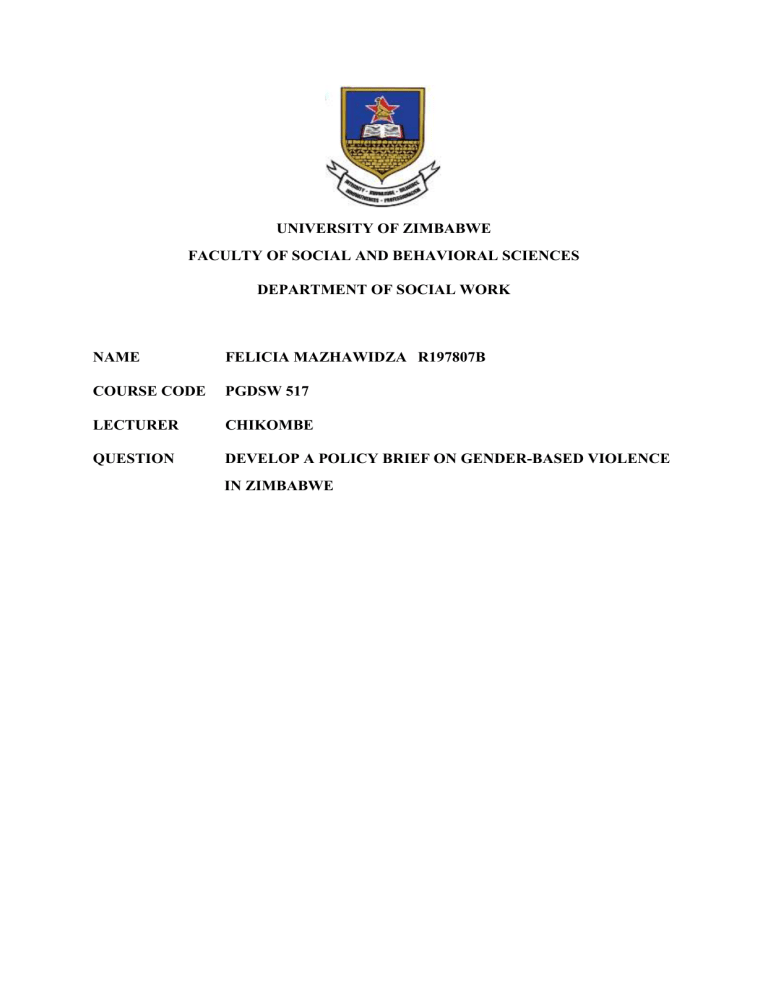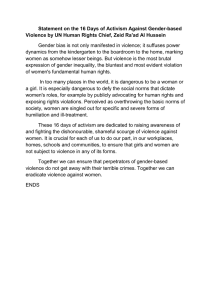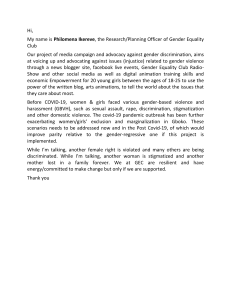
UNIVERSITY OF ZIMBABWE FACULTY OF SOCIAL AND BEHAVIORAL SCIENCES DEPARTMENT OF SOCIAL WORK NAME FELICIA MAZHAWIDZA R197807B COURSE CODE PGDSW 517 LECTURER CHIKOMBE QUESTION DEVELOP A POLICY BRIEF ON GENDER-BASED VIOLENCE IN ZIMBABWE EXECUTIVE SUMMARY One of the prevalent issues in Zimbabwe is gender-based violence in which women and girls are the most affected. This policy brief is a discussion of gender-based violence in Zimbabwe, briefly stating the causes, the current policies, and also the recommendation on how to reduce and possibly put an end to gender-based violence in Zimbabwe. Gender-based violence can take many forms such as sexual violence, physical abuse, economic abuse, and emotional abuse among many others. As the years have gone by there have been limited resources and inadequate policy implementation that have resulted in the continued perpetuation of violence against women. This has made it increasingly difficult for victims to seek just and access essential services and support. DESCRIPTION OF THE PROBLEM The term gender-based violence supported by the United Nations, the World Health Organization, and various academic researchers in the field of gender studies refers to any act of violence that results in or is likely to lead to physical, psychological, or sexual harm or suffering to women or men, which also includes threats of such acts, coercion, or arbitrary deprivation of liberty, whether it occurs in public or private life. Gender-based violence is violence that is directed specifically at women or men on the basis of gender. There are multiple contributing factors to gender-based violence as it is a complex issue. Some of these include mental illness, war, substance abuse, poverty, patriarchal and sexist views, controlling behaviors, marital discord, and also the concepts of masculinity attached to supremacy and nobility. Though an ecological approach may note that there is no single factor alone that causes violence but a combination of the factors may lead to acts of violence. It is also important to note that the psychological explanations for gender-based violence often fail to connect the relationship of the inequalities between men and women. For example, poverty alone is not the sole cause of violence against women but it may trigger or increase the violence that already exists. There are physical, psychological, and social effects that are caused by gender-based violence which may be direct and indirect. Some of the physical effects may lead to health problems both long term and short term for instance disability and chronic health issues. It may also lead to psychological issues for instance or drug use. Economic and social effects affecting the victim are also not limited to. CURRENT POLICIES Below are some of the current policies and plans that have been placed in order to address gender-based violence in Zimbabwe: 1. The National Action Plan on Gender-Based Violence The National Action Plan on Gender-Based Violence is a plan that has an outline of the steps that are needed in order to prevent and respond to gender-based violence in Zimbabwe. The plan includes measures to improve service delivery, the promotion of norms that reject violence, and also strengthening legal frameworks. 2. The Domestic Violence Act The Domestic Violence Act is an act that seeks to protect victims of domestic violence by the provision of legal remedies and also to ensure that perpetrators are held accountable for their actions. The Domestic Violence Act defines domestic violence as a broad term that includes physical, sexual, economic, and emotional abuse. 3. Sexual Harassment Policy for Tertiary Institutions The Sexual Harassment Policy for Tertiary Institutions is a policy that seeks to eliminate sexual harassment in tertiary institutions by the provision of guidelines in order to prevent and respond to such incidents. It also establishes procedures for the report, investigation, and disciplinary actions. 4. The National Gender-Based Violence Strategic Plan (2020-2024) The National Gender-Based Violence Strategic Plan is a strategic plan that lays out the framework in order to address gender-based violence in Zimbabwe. It aims to prevent and also respond to gender-based violence by the improvement of service provision, promotion of gender equality, and strengthening of justice systems. 5. The National Gender-Based Information System The National Gender-Based Information System is a system that aims to improve data collection and analysis of gender-based violence in Zimbabwe. The system provides a platform that tracks and reports cases of violence and also for monitoring the effectiveness of interventions. RECOMMENDATIONS Below are some of the recommendations that can be implemented in order to reduce and possibly bring an end to gender-based violence in Zimbabwe: 1. Address the root causes of gender-based violence Gender-based violence is often rooted in traditional cultural beliefs, norms that perpetuate violence and gender inequality. By addressing the root causes of gender-based violence in Zimbabwe it can lead to the reduction of its prevalence. Addressing the root causes of gender-based violence can be done through awareness campaigns, education, economic empowerment programs for women, and also changes to legislation and policies. 2. Increase public awareness Public awareness campaigns should be increased on gender-based violence by the Zimbabwean government. This will help break the silence and stigma surrounding the issue of gender-based violence. Public awareness campaigns will also help increase the understanding of the impact of gender-based violence on individuals and the entire community. There are men who may be embarrassed to speak out on the issue of gender-based violence whilst there are women who may suffer the same. This will also help encourage victims to report cases and seek support. 3. Improve support for survivors of gender-based violence Civil society organizations and the government should work together alongside other stakeholders in order to improve support services for survivors of gender-based violence. Some of the action that should be taken in this motion is to set up counseling centers and safe houses for victims and survivors as well as the provision funding to organizations that provide support to survivors. 4. Improve access to justice Women who have experienced gender-based violence often face significant challenges in accessing justice. On the other hand, men who have experienced gender-based violence face similar challenges as they can be taunted due to beliefs that men are stronger than women. The government should work towards the improvement of the capacity of the justice system in order to prosecute offenders and also increase justice for the survivors of gender-based violence. The improvement of the increase to justice can include the establishment of specialized courts and clear procedures for fast tracking gender-based cases. 5. Strengthen monitoring and evaluation The government must strengthen monitoring and evaluation mechanisms in order to ensure that policy interventions are effectively implemented and that they achieve intended outcomes. Strengthening monitoring and evaluation can be done through regular assessments and reviews of gender-based programs and policies in order to identify successes and areas that need improvement. In conclusion, significant strides in the reduction of gender-based violence in Zimbabwe can be made by implementing the above recommendations. Gender-based violence is an issue that is a multi-dimensional problem. If the government, civil society, and other stakeholders make a collaborative effort which is necessary in order to put an end to violence that is mainly targeted towards women and girls in some cases men may be affected. REFERENCES Causes and Effects of Gender-Based Violence - University of Minnesota. http://hrlibrary.umn.edu/svaw/advocacy/modelsessions/causes_effects.PDF. Ministry of Higher and Tertiary Education, Science, and Technology Development. 2020. Sexual Harassment Policy for Tertiary Institutions Ministry of Women Affairs, Community, Small, and Medium Enterprises Development. 2020. National Gender-Based Violence Strategic Plan 2020-2024 Ministry of Women Affairs, Community, Small, and Medium Enterprises Development. 2021. National Gender-Based Violence Information Management System. Ministry of Women Affairs, Gender, and Community Development. 2018. National Action Plan on Gender-Based Violence Parliament of Zimbabwe. 2019. Domestic Violence Act



